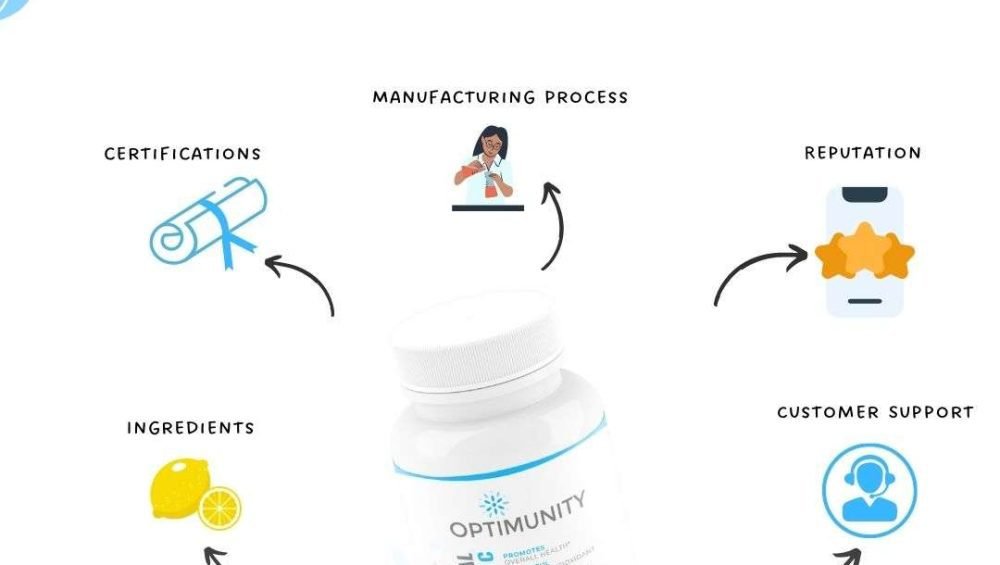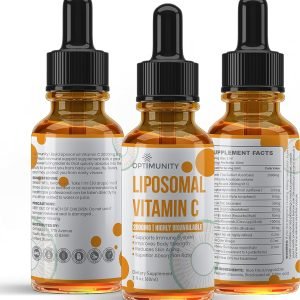Vitamin C, otherwise known as ascorbic acid, has long been widely used to boost the immune system during cold and flu season. The emergence of COVID-19 has also led to an increased interest in supplements to support a healthy immune system year-round.
Health Benefits of Vitamin C Include:
- Boosts Immune System and Response [1]
- Promotes healthier skin [2]
- Antioxidant properties [3]
- Supports heart health [4]
- Improves Brain and Cognitive Functions [5]
No matter the health reason for choosing a Liposomal Vitamin C Supplement, how to pick the best liposomal vitamin c brand to support the needed health boost can be a daunting task due to the many options available.
What should one consider when choosing the best supplement?
The Top 5 Most Important Factors to Choosing the Best Liposomal Vitamin C Supplement:

1. Ingredients
Ingredients are the top consideration for choosing the right supplement. Many brands claim natural ingredients but hide harmful ones behind terms that lots of people simply don’t understand.
What ingredients to watch for:
- Natural- consider if the ingredients are all clearly and simply listed for the product. Avoid ones that include “natural flavors” but fail to specify what exactly they are comprised of.
- Phosphatidylcholine– not many people know what phosphatidylcholine actually is, let alone what it does or how it affects supplements. Phosphatidylcholines are the building blocks of membranes, and supplements using them are of higher quality.
- Sunflower vs. Soy- Sunflower is a superior source for phospholipids because it is non-allergenic and has a much healthier extraction method. Soy is a common allergen, and worse, most soybeans are genetically modified which can lead to negative effects on health [6]. The better choice is a supplement with sunflower as its ingredient source.
- Sugars and other harmful fillers- Sugars, hydrogenated oils, titanium dioxide, and other harmful ingredients are sometimes added to supplements as fillers or to make the shelf life longer. Look for ones that avoid these unnecessary detrimental additives.
2. Certifications
There is no shortage of online supplement suppliers, and with the increase, it can be overwhelming to decide which one to trust. When choosing a supplement brand, the certifications and claims by the supplier should be paramount.
What certifications or claims to be concerned about:
- GMP- GMP stands for Good Manufacturing Practices, and it is a designation that shows that the facility meets requirements set to assure their products are consistently:
- High in quality
- The same with each batch
- Meeting their intended use.
In addition to consistency, GMP certification also ensures products are:
- Free of contaminants
- Have a consistent and documented manufacturing process
- Checked or tested at various stages to meet quality standards.
- FDA vs. Third Party Tested- While the FDA does regulate dietary supplements, it is as food and not as a drug. This means that they monitor marketing claims to ensure that supplement manufacturers do not make unfounded claims such as the ability to cure a disease. Since supplements are not subject to the strict guidelines that drugs are, most consumers rely on third-party testing to verify the highest quality supplements.
Third-Party testing typically tests for:
- Purity- is there mold, yeast, or bacteria present
- Potency- are the contents what is claimed on the labeling
- and Heavy Metals- do they contain harmful heavy metals
- Non-GMO- Despite the Food and Drug Administration, Environmental Protection Agency, and USDA’s claims that GMOs and products produced from GMO crops are safe for human consumption, GMO crops require a higher level of chemicals that are harmful to both the environment and humans. [8] [9] Many consumers are wary of GMOs and seek non-GMO versions whenever possible.
3. Where is it made?
Where a supplement is made is a source of concern for many. With the explosion of availability of cheap, Chinese-made products flooding the market, there are real health concerns for where a product is made.
Not all countries follow the strict business and manufacturing regulations that are present in the USA and most consumers are wary of products made outside the USA. Products made within the USA instill confidence and trust in the supplement provider and buyers expect the best quality product.
4. Reputation, Client Testimonials, and Online Presence
- How long has the company been in business?
- Do the reviews signify happy customers?
- Does this company brand instill confidence?
- These are the questions for every supplement consumer to consider
When evaluating a supplement supplier, shoppers want to know that a company has a proven track record to supply them with a quality product. They read the reviews on Amazon or the eCommerce site and it influences their perception that it is the best-rated brand. If the brand is consistent across its web platform as well as Amazon, the quality content will be easy to spot.
5. Supplier Service and Guarantee
Every day with more and more access to suppliers, consumers expect nothing but the best. In the competitive supplement market, this means delivering a quality product with a guarantee to back it up.
What’s the bottom line?
Customer Service- the ability to get assistance when needed, through chat or email is more important than ever in an environment where customers are used to immediate or near-immediate accessibility to the information they want.
Guarantees- with its rise to dominate the US supply chain, Amazon has set the standard for customer satisfaction and every seller and consumer knows this means the supplier must stand behind their product. When considering which supplement to purchase, buyers want to see that a company is offering a guarantee of their satisfaction. Companies that offer a guarantee for their products do not go unnoticed but instill confidence in their buyers.
When choosing the best liposomal vitamin C supplement, none of these 5 important factors should be sacrificed. Optimunity is the top choice.
Frequently Asked Questions On Liposomal Vitamin C
Q: Why choose a liposomal vitamin C?
A: Liposomal vitamin C offers faster delivery and the best absorption rate because the liposomes carry the vitamin c directly into the bloodstream.
Q: Will liposomal vitamin C give me an upset stomach?
A: One of the benefits of liposomal vitamin C is the delivery bypasses the digestive system and thus the upset stomach that some users of traditional vitamin c have experienced.
Q: Can I make a homemade liposomal vitamin c?
A: While there are some websites that purport to offer a liposomal vitamin c recipe, it is best to trust a professional brand in the process. Without the necessary laboratory equipment to process, it is impossible to achieve the microscopic liposomes necessary in a home kitchen.
Q: What is a good dosage for liposomal vitamin c capsules?
A: The ideal dosage of liposomal vitamin c for immune support and other health benefits is 1500mg.
Citations
[1] Carr AC, Maggini S. Vitamin C and Immune Function. Nutrients. 2017 Nov 3;9(11):1211. doi: 10.3390/nu9111211. PMID: 29099763; PMCID: PMC5707683.
[2] Pullar JM, Carr AC, Vissers MCM. The Roles of Vitamin C in Skin Health. Nutrients. 2017 Aug 12;9(8):866. doi: 10.3390/nu9080866. PMID: 28805671; PMCID: PMC5579659.
[3] Padayatty SJ, Katz A, Wang Y, Eck P, Kwon O, Lee JH, Chen S, Corpe C, Dutta A, Dutta SK, Levine M. Vitamin C as an antioxidant: evaluation of its role in disease prevention. J Am Coll Nutr. 2003 Feb;22(1):18-35. doi: 10.1080/07315724.2003.10719272. PMID: 12569111.
[4] McRae, Marc P. 2008. Vitamin C Supplementation Lowers Serum Low-Density Lipoprotein Cholesterol And Triglycerides: A Meta-Analysis Of 13 Randomized Controlled Trials. Journal Of Chiropractic Medicine 7 (2): 48-58. doi:10.1016/j.jcme.2008.01.002.
[5] Harrison, Fiona E. 2012. A Critical Review Of Vitamin C For The Prevention Of Age-Related Cognitive Decline And Alzheimer’s Disease. Journal Of Alzheimer’s Disease 29 (4): 711-726. doi:10.3233/jad-2012-111853
[6] Magaña-Gómez JA, Cervantes GL, Yepiz-Plascencia G, de la Barca AM. Pancreatic response of rats fed genetically modified soybean. J Appl Toxicol. 2008 Mar;28(2):217-26. doi: 10.1002/jat.1319. PMID: 18041736.
[7] US Food and Drug Administration, How GMOs Are Regulated for Food and Plant Safety in the United States, https://www.fda.gov/food/agricultural-biotechnology/how-gmos-are-regulated-food-and-plant-safety-united-states
[8] Samsel, A., & Seneff, S. (2013). Glyphosate, pathways to modern diseases II: Celiac sprue and gluten intolerance. Interdisciplinary toxicology, 6(4), 159–184. https://doi.org/10.2478/intox-2013-0026
[9] Maghari BM, Ardekani AM. Genetically modified foods and social concerns. Avicenna J Med Biotechnol. 2011 Jul;3(3):109-17. PMID: 23408723; PMCID: PMC3558185.











